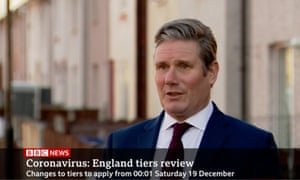Sunak extends furlough scheme until end of April amid speculation tough restrictions could last months
The government is to provide interim cover for EU holiday healthcare costs for people who require routine hospital treatment such as dialysis and chemotherapy in the event there is no Brexit deal to replace the current European Health Care Insurance Scheme (EHIC).
In a written ministerial statement Edward Argar, a health minister, said:
This government will introduce the scheme with the intention that it is used by individuals who are certain to require treatment while abroad, such as regular dialysis, oxygen therapy or certain types of chemotherapy. The government recognises that these ongoing, routine treatment costs can be expensive, and makes travelling abroad extremely challenging for many people.
This means British citizens who need life-sustaining treatment, equipment and medication can now make travel plans for next year at no extra cost.
The arrangements will last for 12 months from 1 January 2021.
Travel insurance for people with pre-existing conditions is expected to rocket to prohibitive prices next year unless there is a replacement scheme for the EHIC system.
Fiona Loud, policy director for charity Kidney Care UK, said the announcement could help up to 30,000 who are on dialysis in the UK right now.
She said travel is “greatly valued” to kidney patients and their families. “Having a break means the world to them; now the vaccination programme has started this is something to look forward to. We welcome this move for patients and the reassurance it gives, but need arrangements to be made so people don’t have to pay in advance,” she said.
Secondary school pupils in England face staggered return to class in January, says No 10
Updated
More than two-thirds of England will be under the strictest restrictions over Christmas, after revised measures will place the highest proportion of the population in tier 3 since the end of the second lockdown.
Almost 38m people will be living under the tier 3 throughout the festive season, as a further 3.7m people in the east and south-east of England will move into top tier restrictions at midnight on Friday.
Restrictions will ease for almost 900,000 people as Bristol and North Somerset will move from tier 3 to 2 and Herefordshire which will exit tier 2 to tier 1, following the government review.
The changes mean just over 67% of the population of England will be in tier 3, 31% in tier 2 and 1.6% in tier 1.

FMQs was the first time that opposition politicians had the chance to question Nicola Sturgeon on the appalling drug deaths figures which were released earlier this week, and she was in conciliatory mood, telling the Scottish Tories’ Holyrood leader, Ruth Davidson, that the deaths were “completely unacceptable” and that “nobody will hear political answers from me”.
Sturgeon also accepted that “sorting it out is our responsibility”, perhaps a nod to critics who believe that the Scottish government has focused on the row with Westminster over devolving drugs laws to allow for safe consumption rooms at the expense of what can be done by Holyrood.
Davidson pointed out “the thing that is entirely devolved is treatment and rehabilitation and that is what the Scottish government has cut to the bone”. She said that leading facilities in Scotland were treating people from overseas while “people from Possil and Dundee are dying” and noted that universal credit funds more beds than Sturgeon’s government does.
Sturgeon said that she would attend the next meeting of the drugs deaths taskforce in January and would make a statement before the end of that month to set out next steps, accepting that there were questions about why there was not more funding for beds and that “many of the criticisms made are valid and legitimate”.
Updated












